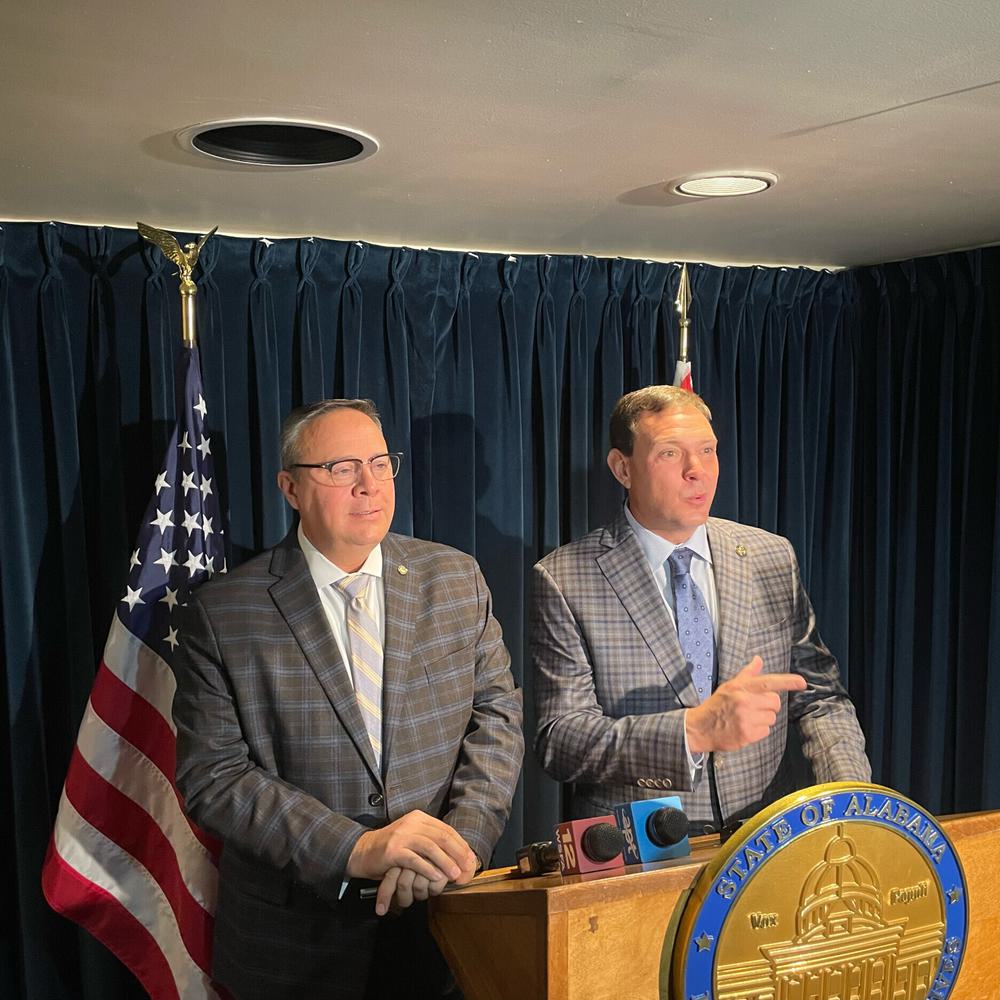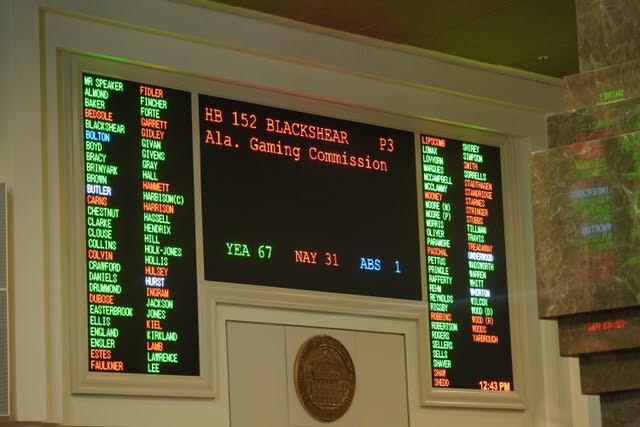MONTGOMERY — The Alabama House of Representatives passed two bills on Thursday to allow comprehensive gambling in Alabama.
The legislation took the lion’s share of the debate for these first two weeks of the regular 2024 session.
State Rep. Chris Blackshear (R-Phenix City), sponsoring the two bills needed to establish gambling, presented them for a lengthy debate before the House.
One bill, House Bill 151 (HB151), will repeal all constitutional amendments allowing gambling in certain parts of the state and remove the state’s constitutional gambling prohibition. The other, House Bill 152 (HB152), authorizes a series of provisions legalizing casino gaming in specific locations, a statewide lottery and online sports betting.
HB151, the constitutional amendment, was first on the floor with a substitute, encompassing the amendment approved in committee on Wednesday, clearing up jurisdictional language and allowing the legislature to grant jurisdiction to any court to hear cases concerning gaming.
While most spoke in favor of the legislation, some gave sundry reasons for concerns about the bill.
Those speaking in favor pointed to the fact that, ultimately, the people of Alabama would have to vote in favor of legislation before it could be enacted. Those opposed mainly spoke on the perceived adverse effects on communities and individuals.
State Rep. Jim Carns (R-Vestavia Hills) spoke in opposition, opining on the social ills he believes would follow legalizing gambling in the state.
State Rep. Ben Harrison (R-Cartwright) also spoke in opposition, even reading a 2010 opinion written by then-State Treasurer Kay Ivey, who wrote extensively at that time in opposition to gambling in the state.
State Rep. Ernie Yarbrough (R-Trinity) spoke at length against the legislation, saying the financial benefits gambling can bring to the state could only be done at the backs of gambling addicts and at the destruction of the personal wealth of Alabamians.
“[T]he question before us is not whether the individual should or could throw some dice on a friendly wager,” Yarbrough said. “It is whether or not we as their elected officials should become inextricably linked with and connected to an extremely well-funded marketing campaign that only exists to defraud the people of their wealth with nothing of actual goods or services in return, except adding addiction and their own financial ruin, because it cannot exist on the backs of casual gamblers, it has to have addicts in order to be profitable.”
State Rep. Arnold Mooney (R-Indian Hills) offered an amendment to require the citizens of an area to vote on a referendum before a gaming establishment could operate in that locality. The bill’s current form would allow a county commission or city council to approve or place a gaming referendum on a local ballot. The amendment was ultimately struck down, and HB151 passed with a vote of 70-32.
HB152 also passed with a committee substitute.
The substitute included an amendment that removed several sections that initially prohibited certain employees with the commission from having more than 1% of a financial interest in any gambling establishment under the commission’s purview. The amendment ensures that these employees cannot have any financial interest in any such endeavor.
It also clarified that 501c10 institutions could engage in traditional raffles and paper bingo.
Additionally, the bill initially said that if no license was granted in Houston and Lowndes counties within five years, the gaming commission could give those licenses to other areas. Some saw this as a loophole that could transfer those licenses to other parts of the state.
SEE: High stakes game: Lawmakers eyeballing loopholes that could bring casino to Baldwin County
State Rep. Matt Simpson (R-Daphne) offered a floor amendment clarifying that the licenses in Houston and Lowndes Counties would remain in those localities. It also explained that the gaming commission could only transfer a gaming license to a different owner and not to another county.
The bill passed with a final vote of 67-31 with one abstention. House Speaker Nathaniel Ledbetter (R-Rainsville) applauded Blackshear and State Rep. Andy Whitt (R-Harvest), both of whom sat on the Alabama House Gaming Study Group and were responsible for answering lawmakers’ questions.
Blackshear and Whitt spoke to the media after the final floor vote, offering criticism of the “special interests” they claim have been spreading misinformation about the bill since it was announced.

Neither Ledbetter nor Blackshear gave much information on what they anticipate as the Senate prepares to take up the legislation, offering no insight or timeline.
If it passes the Senate, HB151 would require a popular vote of the Alabama public before it could be approved. The vote is currently scheduled for the November 8 presidential ballot.
HB152 includes the establishment of the Alabama Gaming Commission, which consists of four members appointed by the Governor, two by the Speaker of the House (including a minority leader appointee), two by the Senate President Pro Tempore and one by the Lieutenant Governor. The commission will appoint an executive director.
It would also create an enforcement arm not administered under the Alabama Law Enforcement Agency (ALEA). Instead, the executive director will appoint a gaming enforcement officer to hire investigators, auditors, compliance officers and administrative staff. Those staff certified under the Alabama Peace Officer Standards and Training Commission will have arrest powers. Notably, the attorney general’s office will not handle prosecutor responsibilities; those fall to the local district attorney.
The licensing will be limited to specific counties in the state, including three already-existing locations operated by the Poarch Band of Creek Indians (PCI) on their federal tribal lands.
The locations are the city of Birmingham and Macon, Greene, Lowndes, Houston, and Mobile Counties. The Governor will be authorized to enter into a negotiated agreement, also called a compact, with the PCI for a location rumored to be in Northeast Alabama.
Several of those counties currently have gambling establishments. However, Blackshear claimed those existing non-PCI locations are not guaranteed a license. Blackshear also said that he and Whitt sat down with interested state parties four weeks ago, and they were only allowed to see the parts of the legislation that pertained to them.
The commission is only responsible for approving seven gaming licenses. Potential bidders must submit a minimum $5 million licensing fee, with no upper limit. The minimum phase one investment is $35 million, and construction must begin within 12 months of the license being issued. All potential locations are subject to approval by a county commission or city council. However, if desired, the local body can put the issue on a local referendum.
The bill creates the Alabama Lottery Corporation for the state lottery, which includes seven voting members appointed by the commission. All state lottery funds will go to the Lottery for Education Fund, which the bill will create if passed.
All revenue from non-lottery gaming will go to the Gaming Trust Fund (GTF). All GTF funds will funnel into the state’s “rainy day fund” until the fund reaches $300 million. After that, 95% will go to the GTF, 3% to the county commission and 2% to the county or municipality where the gaming facility is located.
After taking care of the gaming commission expenses, the remaining funds will be subject to the state’s annual supplemental appropriations process. Supplemental funds can then be distributed to non-reoccurring state expenses.
To connect with the author of this story or to comment, email craig.monger@1819news.com.
Don't miss out! Subscribe to our newsletter and get our top stories every weekday morning.










